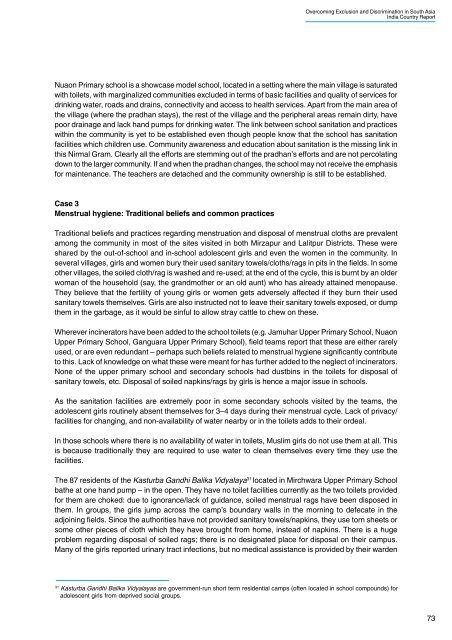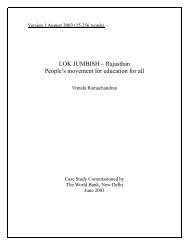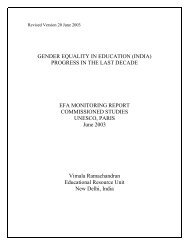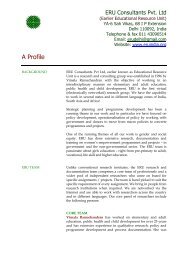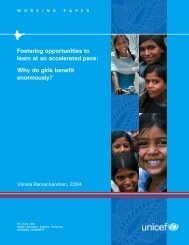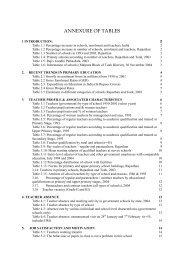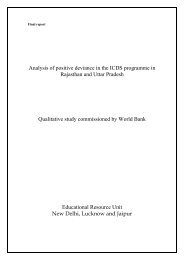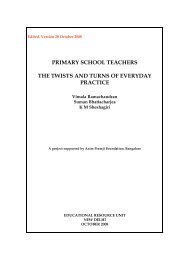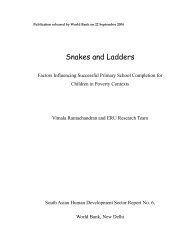Equity in School Water and Sanitation
Equity in School Water and Sanitation
Equity in School Water and Sanitation
Create successful ePaper yourself
Turn your PDF publications into a flip-book with our unique Google optimized e-Paper software.
Overcom<strong>in</strong>g Exclusion <strong>and</strong> Discrim<strong>in</strong>ation <strong>in</strong> South AsiaIndia Country ReportNuaon Primary school is a showcase model school, located <strong>in</strong> a sett<strong>in</strong>g where the ma<strong>in</strong> village is saturatedwith toilets, with marg<strong>in</strong>alized communities excluded <strong>in</strong> terms of basic facilities <strong>and</strong> quality of services fordr<strong>in</strong>k<strong>in</strong>g water, roads <strong>and</strong> dra<strong>in</strong>s, connectivity <strong>and</strong> access to health services. Apart from the ma<strong>in</strong> area ofthe village (where the pradhan stays), the rest of the village <strong>and</strong> the peripheral areas rema<strong>in</strong> dirty, havepoor dra<strong>in</strong>age <strong>and</strong> lack h<strong>and</strong> pumps for dr<strong>in</strong>k<strong>in</strong>g water. The l<strong>in</strong>k between school sanitation <strong>and</strong> practiceswith<strong>in</strong> the community is yet to be established even though people know that the school has sanitationfacilities which children use. Community awareness <strong>and</strong> education about sanitation is the miss<strong>in</strong>g l<strong>in</strong>k <strong>in</strong>this Nirmal Gram. Clearly all the efforts are stemm<strong>in</strong>g out of the pradhan’s efforts <strong>and</strong> are not percolat<strong>in</strong>gdown to the larger community. If <strong>and</strong> when the pradhan changes, the school may not receive the emphasisfor ma<strong>in</strong>tenance. The teachers are detached <strong>and</strong> the community ownership is still to be established.Case 3Menstrual hygiene: Traditional beliefs <strong>and</strong> common practicesTraditional beliefs <strong>and</strong> practices regard<strong>in</strong>g menstruation <strong>and</strong> disposal of menstrual cloths are prevalentamong the community <strong>in</strong> most of the sites visited <strong>in</strong> both Mirzapur <strong>and</strong> Lalitpur Districts. These wereshared by the out-of-school <strong>and</strong> <strong>in</strong>-school adolescent girls <strong>and</strong> even the women <strong>in</strong> the community. Inseveral villages, girls <strong>and</strong> women bury their used sanitary towels/cloths/rags <strong>in</strong> pits <strong>in</strong> the fields. In someother villages, the soiled cloth/rag is washed <strong>and</strong> re-used; at the end of the cycle, this is burnt by an olderwoman of the household (say, the gr<strong>and</strong>mother or an old aunt) who has already atta<strong>in</strong>ed menopause.They believe that the fertility of young girls or women gets adversely affected if they burn their usedsanitary towels themselves. Girls are also <strong>in</strong>structed not to leave their sanitary towels exposed, or dumpthem <strong>in</strong> the garbage, as it would be s<strong>in</strong>ful to allow stray cattle to chew on these.Wherever <strong>in</strong>c<strong>in</strong>erators have been added to the school toilets (e.g. Jamuhar Upper Primary <strong>School</strong>, NuaonUpper Primary <strong>School</strong>, Ganguara Upper Primary <strong>School</strong>), field teams report that these are either rarelyused, or are even redundant – perhaps such beliefs related to menstrual hygiene significantly contributeto this. Lack of knowledge on what these were meant for has further added to the neglect of <strong>in</strong>c<strong>in</strong>erators.None of the upper primary school <strong>and</strong> secondary schools had dustb<strong>in</strong>s <strong>in</strong> the toilets for disposal ofsanitary towels, etc. Disposal of soiled napk<strong>in</strong>s/rags by girls is hence a major issue <strong>in</strong> schools.As the sanitation facilities are extremely poor <strong>in</strong> some secondary schools visited by the teams, theadolescent girls rout<strong>in</strong>ely absent themselves for 3–4 days dur<strong>in</strong>g their menstrual cycle. Lack of privacy/facilities for chang<strong>in</strong>g, <strong>and</strong> non-availability of water nearby or <strong>in</strong> the toilets adds to their ordeal.In those schools where there is no availability of water <strong>in</strong> toilets, Muslim girls do not use them at all. Thisis because traditionally they are required to use water to clean themselves every time they use thefacilities.The 87 residents of the Kasturba G<strong>and</strong>hi Balika Vidyalaya 31 located <strong>in</strong> Mirchwara Upper Primary <strong>School</strong>bathe at one h<strong>and</strong> pump – <strong>in</strong> the open. They have no toilet facilities currently as the two toilets providedfor them are choked: due to ignorance/lack of guidance, soiled menstrual rags have been disposed <strong>in</strong>them. In groups, the girls jump across the camp’s boundary walls <strong>in</strong> the morn<strong>in</strong>g to defecate <strong>in</strong> theadjo<strong>in</strong><strong>in</strong>g fields. S<strong>in</strong>ce the authorities have not provided sanitary towels/napk<strong>in</strong>s, they use torn sheets orsome other pieces of cloth which they have brought from home, <strong>in</strong>stead of napk<strong>in</strong>s. There is a hugeproblem regard<strong>in</strong>g disposal of soiled rags; there is no designated place for disposal on their campus.Many of the girls reported ur<strong>in</strong>ary tract <strong>in</strong>fections, but no medical assistance is provided by their warden31Kasturba G<strong>and</strong>hi Balika Vidyalayas are government-run short term residential camps (often located <strong>in</strong> school compounds) foradolescent girls from deprived social groups.73


